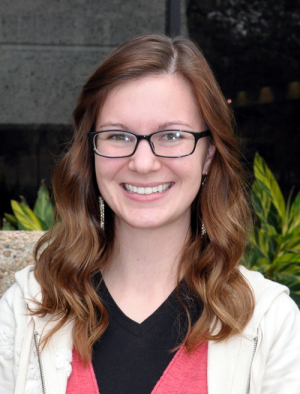Katy Olafson, a Ph.D. candidate in chemical and biomolecular engineering and co-advised by Drs. Peter Vekilov and Jeffrey Rimer, has been awarded a one-year predoctoral fellowship in the Gulf Coast Consortia/W.M. Keck Center for Quantitative Biomedical Sciences Nanobiology Interdisciplinary Graduate Training Program (NIGTP).
The competitive program provides high-level training in the exploration of nanoscience and biology interdisciplinary studies. Trainees will become experienced investigators using unconventional approaches in the development of diagnostics and therapeutics.
Olafson will investigate current antimalarial medications with the goal of understanding the drug inhibition mechanism to ultimately design novel antimalarial treatments. While malaria has largely been eradicated in the United States, it is endemic to areas in which approximately 40% of the global population resides, causing 515 million episodes annually and killing over 2000 people on a daily basis.
Plasmodium falciparum is one of five parasite species that causes the mosquito-borne disease. The parasite replicates within the host’s red blood cells and consumes hemoglobin. The process of catabolism releases heme, which oxidizes to form hematin. Hematin is highly toxic to the parasite and, to the parasite's advantage, is sequestered into micrometer-size crystals, known as hemozoin. Crystallization prevents the toxic hematin from eliminating the parasite.
The target of current antimalarial drugs is to inhibit heme detoxification, killing the parasite. Plasmodium is highly adaptive and resistant to drugs, and the primary focus of the research is to understand the mechanism of hematin crystallization, identify how current antimalarials prevent the crystals from forming, and then design novel drugs to overcome drug resistance. Once the fundamental mechanisms are identified and new medications are designed, a nanoencapsulation drug delivery system will be implemented for effective and efficient drug delivery.
Olafson will explore the nanoscale dynamics of crystallization of beta-hematin (the synthetic form of hemozoin). She aims to identify active growth sites on the surface of beta-hematin crystals and propose inhibition pathways which will underline the design of novel malaria treatments.
The Gulf Coast Consortia (GCC) comprises six prominent Gulf Coast institutions, Baylor College of Medicine, Rice University, University of Houston, University of Texas Health Science Center at Houston, University of Texas Medical Branch at Galveston and University of Texas M. D. Anderson Cancer Center. The GCC builds interdisciplinary, collaborative research teams and training programs in biological sciences at their intersection with the computational, chemical, mathematical, and physical sciences.
The Keck Center for Quantitative Biomedical Science Training provides a unique intellectual and physical setting in which to train the next generation of scientists with expertise in multiple disciplines, able to reach across boundaries to advance insight and understanding.
